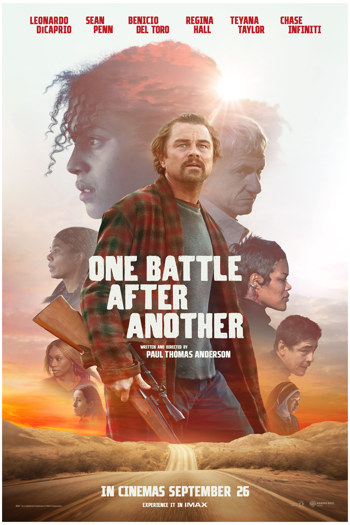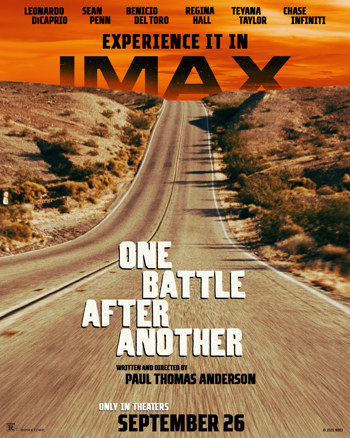Movies

New Releases • A-D • E-H • I-P • Q-Z • Articles • Festivals • Interviews • Dark Knight • Indiana Jones • John Wick • MCU
One Battle After Another, starring Leonardo DiCaprio and Chase Infiniti, directed by Paul Thomas Anderson
Trailer: Warner Bros.
One Battle After Another
Directed by Paul Thomas Anderson
Rated R
Fought 26 September 2025
#OneBattleAfterAnotherMovie
"Call us back when you have the time."
One Battle After Another is a firecracker of a movie. It packs an attitude. It’s angry.
Don’t Look Back in Anger

It’s uniquely rewarding to take a step back and take a deeper look under the hood of this movie that’s sure to provoke knee-jerk reactions. This is a satire of sorts, a figurative drama with over-the-top characters playing out a highly tense scenario.
Some will no doubt balk at the righteous rage that comes on strong – so strong – during the movie’s opening scenes of an immigrant heist at the Otay Mesa Immigration Center in San Diego. For others, it’ll register as a zeitgeist movie, a perfect encapsulation of these heated times, particularly in the realm of ideology-driven politics, violent rhetoric and the seemingly inevitable violent actions that result.
Considering Top Gun: Maverick, wrapped in a patriotic flag, found box office fortune and glory in 2022 – a mere three years ago – perhaps a more concerning observation is how far things have shifted since then. This is an all-in fever dream in which far-left revolutionaries (some of them relatively nuanced) battle far-right supremacists (all of them caricatures) for the future of America. In Maverick, the threat was from the outside. In OBAA it comes from within.
As always, the reality is vitriol and horrible rhetoric comes from both sides of the political divide while the discussions have increasingly devolved to our side/their side boundaries and diminishing common ground. That leaves those of us who are resolutely unaffiliated stuck in the middle and appalled by both left and right, isolated on an island that seems to be ever shrinking. In the process, so many words have started to lose their meaning.
And that’s where writer/director Paul Thomas Anderson has done something pretty clever. In retrospect, after letting the dust of all the movie’s mayhem settle and subside, none of the characters come out of this looking "good." Maybe a case could be made for Willa, a teenager thrust into a really bad spot by two revolutionary parents with a whole multi-car train load of baggage. At least for a little while Willa’s a sympathetic character. But the door’s open for her to go down her own dangerous path.
Nonetheless, while both sides presented here are dangerous and extreme, it’s clear PTA is more sympathetic to the violent revolutionaries on the far (far) left – who espouse free borders free from fear among other liberal dares regardless of life, limb and property. The opposition is a group of violent white supremacists – who propagate archaic nonsense about the evils of mixed-race relationships and other simplistic ideologies – on the far (far) right.
The revolutionaries – with all their machine guns and explosives (both ordnance and attitude) – are essentially, in this movie, the good guys. They get cool code names like Rocketman and Pussy Jungle. The white supremacists are laughable and given surnames of Lockjaw and Toejam.
As always, the path forward is somewhere in the middle.
But drama doesn’t come from the middle, following a path in which no one party has the upper hand, but progress is made, nonetheless. The drama comes from the fringes.
So it is, then, in One Battle After Another the entire nation is dissected into the radical left and the radical right with a viewpoint that seems informed by all the political sophistication and objectivity Jimmy Kimmel and Jake Tapper could possibly muster.
All that said, it’s also a surprisingly entertaining 161-minute ride through all sorts of ideas.
Cigarettes & Alcohol
As Anderson’s source of inspiration, credit is given to Thomas Pynchon’s novel Vineland, which is set in 1984 and first published in 1990. PTA has craftily moved the setting to modern times while keeping the political core.
Maybe it is a zeitgeist movie. But be careful how you associate the tag with the story.
Up front, there’s the obvious concerns around ICE, free borders and abortion rights. Be careful what you wish for, though. With great freedom comes great responsibility.
And while doing that wishing, watch Bob Ferguson closely. He’s a revolutionary, but mostly a wannabe revolutionary who gets involved with a really angry Black woman named Perfidia Beverly Hills (another cool name). During a bank robbery intended to fund their radical group, the French 75, Perfidia shoots and kills a Black cop.
That’s early in the movie, but it’s also the beginning of the end for everybody.
That includes one of those radical supremacists, Col. Steven J. Lockjaw. A white supremacist carrying on a sexual relationship with Perfidia – one in which he indulges in his gun-to-the-back-of-the-head fetish – and potentially fathering her child? Oh yeah. That spells all kinds of disasters in the making, especially with Lockjaw gunning for membership in a silly whites-only group called the Christmas Adventurers. (The chances of PTA making a movie for Angel Studios are nil.)
But, what about Bob?
Picking up 16 years after that deadly bank robbery, Bob’s spent the past 30 years of his life under the influence of drugs and alcohol. His brain is so addled he no longer remembers all the codes from the revolutionary playbook. He’s now a washed-up revolutionary.
What time is it?
The answer isn’t on any watch anywhere in the world. But, for the life of him, Bob can’t remember the code he now needs to respond with so he can find the rendezvous point to reunite with his 16-year-old daughter, who’s gone missing from a high school dance while the military – under the stern leadership of Lockjaw – homes in on their targets.
Q: What time is it?
A: Time doesn’t exist, but it controls us anyway.
Bob Ferguson (Leonardo DiCaprio) rattles off one password after another in One Battle After Another, directed by Paul Thomas Anderson
Film clip: Warner Bros.
Leonardo DiCaprio is Bob and he delivers something of a career turning point. An older man. A father. Disheveled. No longer the dashing poster child of youthful Hollywood sexuality. Leo is great, though, in making this character come alive. He’s frustrated. He’s confused. He’s out of touch. He’s mighty funny. (From the infinite wisdom of Bob: "I know how to drink and drive. I know what I’m doing.")
He’s softened over time. He admits he doesn’t get angry much anymore.
And he’s even clumsy around notions of pronouns, transitioning and non-binaries. His tone softens as he ages and starts to distance himself – intentionally or not – from at least some of the ultra-left liberal BS. Unfortunately, there isn’t a comparable character that learns to gain distance from the ridiculous radical-right BS. Lockjaw remains locked-in.
Sean Penn is Lockjaw. He’s looking old and mighty buff, with a jaw motion tic that serves as an affectation suitably reflecting the character’s name. As he’s proven many times in the past, Penn’s good at being bad. Lockjaw is indeed one bad man on so many levels, right down to the treatment of Willa, who undergoes a DNA test to determine her paternity.
Willa’s in some respects the movie’s true heart and she’s brought to life by rising star Chase Infiniti (such a great name for reals). More about her in a bit.
D’You Know What I Mean?
Anderson skillfully juggles a number of characters, situations and threads, picking up the pace once Leo is thrown into the primary storyline: the feds are after him and his daughter’s missing.
It’s a rolling terrain narratively and geographically, but PTA isn’t looking for answers or solutions. There isn’t a call to calm. If anything, the ending merely points toward more of the same going forward.
PTA’s a maverick filmmaker and not a bandwagon jumper, but he is all-in on prioritizing the theatrical experience with this one, having shot OBAA on VistaVision (a vintage format in which the movie is being presented during this initial theatrical release in only four theatres around the world).
To that end, there’s something "classic" about the movie’s climactic chase, simply in pure visual terms. Shot in Borrego Springs, Calif., the barren, undulating terrain holds a sight line mid screen, with the view shifting up and down as one car barrels down the open road, then two, then three. It’s a very simple, basic cinematic visual, but it works so well, offering an eyeful in those premium formats that boost the box office, including IMAX.

Of all things, what’s most jarring about OBAA technically is its use of music. Sometimes it hits perfectly with classic rock (including American Girl, Eye of the Tiger and The Revolution Will Not Be Televised) that reflects the on-screen heartbeats. But one scene, featuring a classic Christmas carol (Hark! The Herald Angels Sing) goes on too long and too loud (but maybe that’s the point). The score by Radiohead’s Jonny Greenwood (PTA’s go-to composer for six movies now) is an odd one. At times it seems incessant and unnecessary, but at other times the jazzy music works some magic.
Stop Crying Your Heart Out
OBAA touches the fringe of being an equal-opportunity offender, which is precisely what a story like this should do.
Even as Bob confronts his own acceptance of the world that’s been changing around him while he’s been busily under the influence, the jabs to the left and the right start coming.
With Bob’s agitation over the missing pass code, his over-the-phone conduct begins to intimidate an equally middle-aged co-revolutionary who calls out how the call must now end because his "safe space" is being violated.
Even the now verboten "R" word makes a cameo.
The face of the French 75, Perfidia, is played by Teyana Taylor in a mighty fierce and fearless performance. Her goal is to tear down fascist regimes, but her approach is very much in the spirit of fighting the monster by becoming a potentially more dangerous monster. And she’s Willa’s absentee mother. Brought under a witness protection program by her illicit lover, Lockjaw (as he refers to it, "the warm embrace of the federal government"), she can’t handle the basics and mundanity of working for a living and paying the bills in a quiet suburb. She flees the scene and scurries off to parts unknown. It’s posited maybe she’s in a safe haven like Cuba or Algeria. Back home, her fellow revolutionaries now deem her to be a lowly rat who betrayed their trust and ratted them out to the same government they had fought against together.
Which brings us back to Willa. Questions are asked of her in the movie’s surprisingly sober and touching conclusion.
"Are you happy?"
"Are you free?"
"Will you try to change the world?"
"We failed. Maybe you’ll make it right."
That line should’ve been a higher calling, a call to move forward differently. But PTA – rightly or wrongly – doesn’t take that route. It’s certainly realistic to only expect more of the same, but there could’ve been a lot of power derived from seeing her move down a different path instead of following her mother’s radical footsteps.
Some Might Say
A collection of bonus quotes – scribbled during the screening – that simply didn’t fit but deserve sharing:
"I thought you took AP common sense."
"Freedom. When you have it, you don’t appreciate it. When you miss it, it’s gone."
"Teaching the right kind of history, I hope."
"Revolutionary violence is the only way."
"Every revolution begins by fighting demons."
• Originally published at MovieHabit.com.


